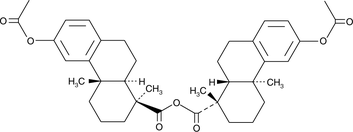Description
A potent, semi-synthetic LXR agonist derived from extracts of the mayapple; induces the expression of the ABCA1 reverse cholesterol transporter to increase the efflux of cholesterol from enterocytes and thus inhibits the overall absorption of cholesterol (ED50 = 1 nM)
Formal name: 6-(acetyloxy)-1,2,3,4,4a,9,10,10a-octahydro-1,4a-dimethyl-1-phenanthrenecarboxylic acid, anhydride
Synonyms: APD
Molecular weight: 614.8
CAS: 344327-48-6
Purity: ≥98%
Formulation: A crystalline solid
Product Type|Biochemicals|Receptor Pharmacology|Agonists||Research Area|Cardiovascular System|Cardiovascular Diseases|Atherosclerosis||Research Area|Cardiovascular System|Lipids & Lipoproteins||Research Area|Endocrinology & Metabolism|Hormones & Receptors|FXRs & LXRs



